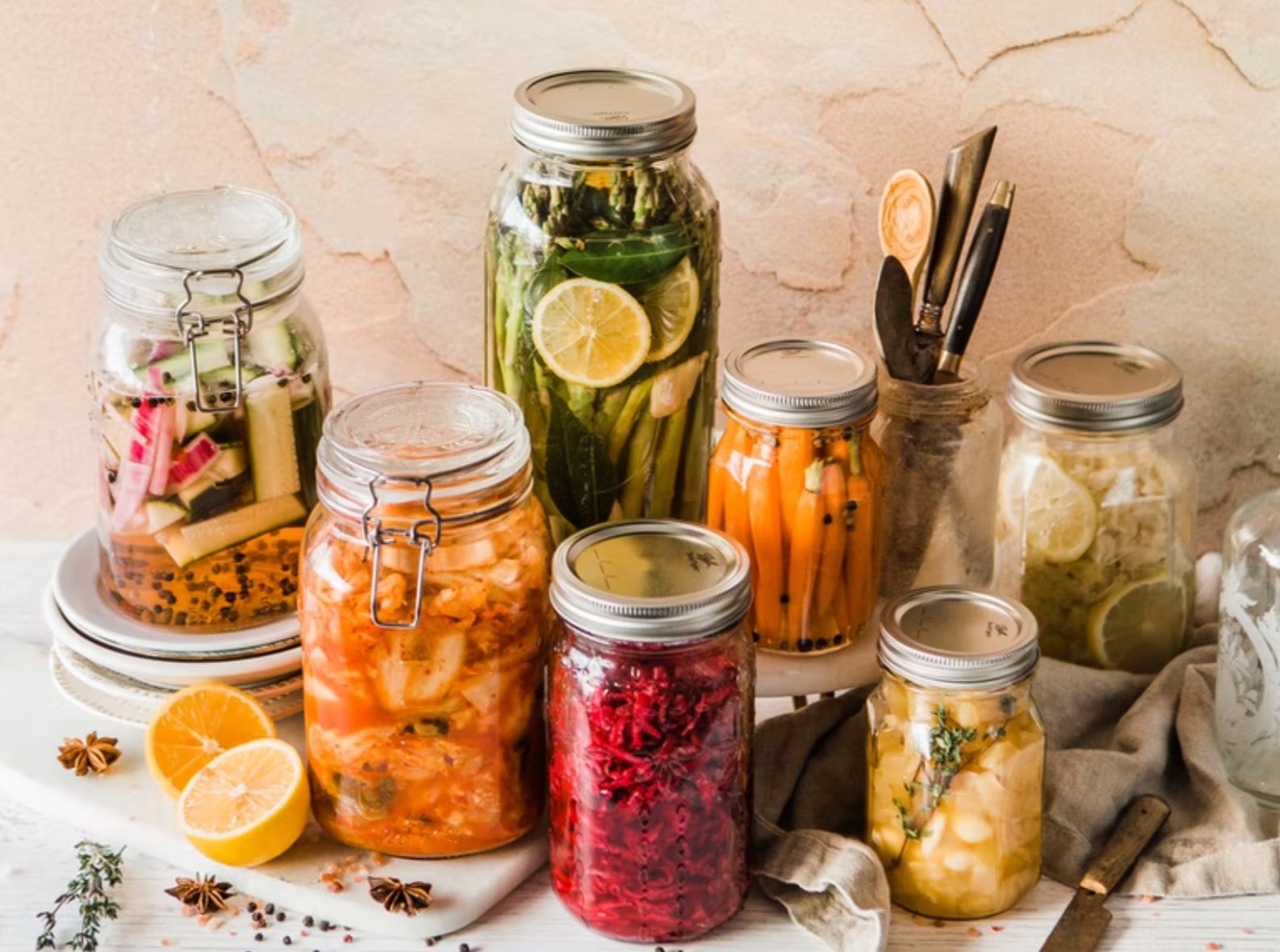It is no news that our digestive tract is teeming with a hundred trillion bacteria and other microorganisms. And, research has revealed the importance of maintaining this diverse and healthy microbial community in our guts as it plays a crucial role in strengthening our immune system and warding off inflammation. Chronic inflammation is never a good thing – it may lead to several health problems, from obesity and diabetes to neurodegenerative diseases.
So, what’s the good news? We have an easy way to maintain a healthy gut microbiome – fermentation!
What is fermentation?
Fermentation is a process in which bacteria and yeast break down sugars in food.
Even though the trend of fermented foods might seem recent, several cultures have been enjoying them for about 10,000 years. It all started with preservation, long before the days of refrigeration. In colder climates, fermenting foods made vegetables available throughout the long winter months. Microorganisms, such as bacteria, yeast, or fungi, convert organic compounds like sugars and starch into alcohol or acids. These act as natural preservatives and leave them with a distinctively strong and slightly sour flavor.
In addition to helping food last longer, fermentation also enhances the taste of foods, giving them added complexity. Plus, the fermentation process works other forms of magic on foods, changing them and adding nutrients.
Point to note here – not all fermented foods have beneficial bacteria. For example, beer loses them during processing. Baking and canning foods can also make them inactive.
Benefits of fermented foods
Apart from longer shelf lives (which do not matter as much anymore, thanks to refrigeration and vacuum packaging!!), fermented foods offer a host of other benefits.
Although there are only a limited number of studies on fermented foods, there is enough evidence that these foods provide health benefits well beyond the starting materials.
The good bacteria help you fight the bad ones
Daily, we ingest pathogenic (disease-causing) bacteria. Of course, we don’t always fall sick from it. When helpful bacteria thrive in our bodies, they act as our protectors. They surround the pathogens in the gut, produce acids that make the gut uninhabitable for these bad guys and stimulate the immune system to fight them off.
Fermentation improves how our gut digests food
Fermentation is similar to pre-digestion because good bacteria convert certain components of food into alcohol or acids, making it easier for us to absorb the nutrients. For example, the probiotics in yogurt help digest some of the lactose (milk sugar), so if you're lactose intolerant you may be able to enjoy yogurt. Another great example is sourdough, in which fermentation improves mineral availability, lowers glycemic responses and helps break down gluten.
Improves the availability of nutrients
When foods ferment, certain microbes produce small amounts of B vitamins (such as thiamin, riboflavin, niacin, and even B12). This wonderful process also increases levels of vitamins A, C, and K in some foods. And, you know what? Food fermentation can result in increased folate concentrations. Some natural compounds, like phytic acid found in legumes, may inhibit our absorption of nutrients like iron and zinc. However, by fermenting these foods, we remove these ‘anti-nutrients’, making their nutritional content more available to us.
Source of beneficial lactic acid bacteria
Fermented foods add bacteria that have a potential probiotic effect. Probiotics play an important role in the protection against harmful microorganisms and also strengthen the immune system. Probiotic amounts produced by fermented foods, of course, vary and the amount of thriving bacteria depends on a number of factors.
They can help restore your gut health after taking antibiotics
Well, at some point or other, most of us have used antibiotics. But, often, antibiotic doses lead to diarrhea or other digestive problems. The main reason for upset stomach is that antibiotics wipe out both good and bad bacteria. When you add fermented foods into your diet, you could reintroduce these good fellas back. For these good bacteria to grow and thrive, eat plenty of soluble fiber from foods. Insoluble fiber, from whole grains, though good for you is not easily fermented. So, it doesn’t really contribute to the diversity of your gut bacteria.
The science!
While fermentation has long been used to preserve foods, research into the health benefits of fermented foods is relatively new.
However, lactic acid bacteria (LAB) have been some of the most studied microorganisms. When foods are fermented, these bacteria synthesize vitamins and minerals, produce biologically active peptides with enzymes, and remove some non-nutrients.
The biologically active peptides, which are produced by the fermentation bacteria, are also well known for their health benefits. These peptides have a host of proven benefits. For example, conjugated linoleic acids (CLA) lower blood pressure, exopolysaccharides show prebiotic properties, bacteriocins have anti-microbial effects, and sphingolipids are known for anti-carcinogenic and anti-microbial properties, and bioactive peptides exhibit anti-oxidant, anti-microbial, opioid antagonist, anti-allergenic, and blood-pressure-lowering effects.
How often should you eat fermented foods?
As the research is new, there are no official guidelines for the amount or the frequency of including fermented foods in your diet.
We recommend that, for the best results, start slow. Add one or two servings per day, and then work your way up. Starting slow is very important if fermented foods are new to you or you are not used to a fiber-rich diet as you may experience bloating or flatulence in the beginning.
Moreover, different fermented foods have different strains, so choose a variety of fermented foods. Look for foods with active types of lactic acid bacteria, as there is a host of research behind its health benefits for the gut.
Simple ways to add fermented foods to your life
Start with one of the easiest foods – plain yogurt or Greek yogurt. After all, it is not just widely available but also pretty tasty! Opt for organic options when you can.
You can add more depth to your smoothies and diversify your taste buds by adding milk kefir to your blender, along with fiber-rich fruits and veggies. Again, organic is much better than other options, both for kefir and fiber food.
Add pickled vegetables as a side with your meals or top a salad. You can even toss some sauerkraut into a burger, sandwich, or wrap. While you are at it, switch your white sandwich bread with sourdough bread. At HappyLyfe, we have many options for both!
Oh, and switch your sugary fizzy drinks with equally yummy, and a LOT healthier, options, such as water kefir, jun, or kombucha. There are so many flavors available on HappyLyfe!
Other really good options are natto, tempeh, miso, and fermented fish. They may be an acquired taste though!
Lastly,
Remember, though that even though fermented foods have loads of potential benefits, they’re not a magic bullet. So, maintain an overall healthy lifestyle – sleep well, take care of your mental and physical health, and eat well most of the time.

 English
English
 Thai
Thai


